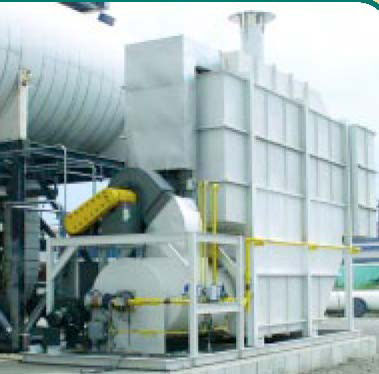High efficiency thermal fluid heating system

High efficiency thermal fluid heating system
Thermal fluid heaters and hot oil systems are used in industrial applications for safe, consistent, and reliable indirect heating and cooling. In a closed-loop system, the thermal fluid circulates throughout the system, maintaining a steady supply of heat. Also sometimes referred to as hot oil heating system or a DOWTHERM™ heating system, these high-efficiency systems are found in a variety of applications in many industries, including:
- Asphalt
- Chemical
- Food industry
- Laundry
- Petrochemical
- Pharmaceuticals
- Plastics
- Process equipment
- Specialty paper
- Textiles
- Wood
THERMAL FLUID HEATING SYSTEM DESIGN
At Thermal Fluid Systems, Inc., our high-efficiency thermal fluid heater design uses a three-pass configuration. Each carbon steel, high-efficiency thermal fluid heating system includes a three-pass dual helical coil heat exchanger, custom-designed isolation valves, a pump, strainer, a degasser, burner, expansion tank, temperature blocking vessel, and safety controls. You may also choose from additional options such as a drain tank and secondary heating and cooling controls.
We design each high-efficiency DOWTHERM heating system to customer specifications following rigorous quality standards, including:
- American Society of Mechanical Engineers (ASME)
- CSA/CGA
- NEMA
- NFPA
- United States Coast Guard (USCG)
- American Bureau of Shipping (ABS)
Based on the application and process needs, our thermal fluid heaters may be powered by:
- Natural gas
- Propane
- Biodiesel
- Fuel oil numbers 2, 4, and 6
- Bunker C oil
- Waste liquid and gas products
A variety of NEMA ratings are also available, including 1, 3R, 4, 4X, 7, or 12.
TYPES OF THERMAL FLUID HEATING SYSTEMS
Thermal fluid heating systems can operate on a variety of fuel sources. There are three main types of thermal fluid heating systems: gas (or liquid fuel), electric, and waste fuel. The right design for your application depends on factors such as:
- Efficiency
- Thermal stability over a range of temperatures
- Equipment size
- System adaptability
- Physical properties such as the freezing, flash, and fire points; vapor pressure; viscosity; and rate of heat transfer
Each choice of thermal fluid system fuels has distinct advantages and disadvantages.